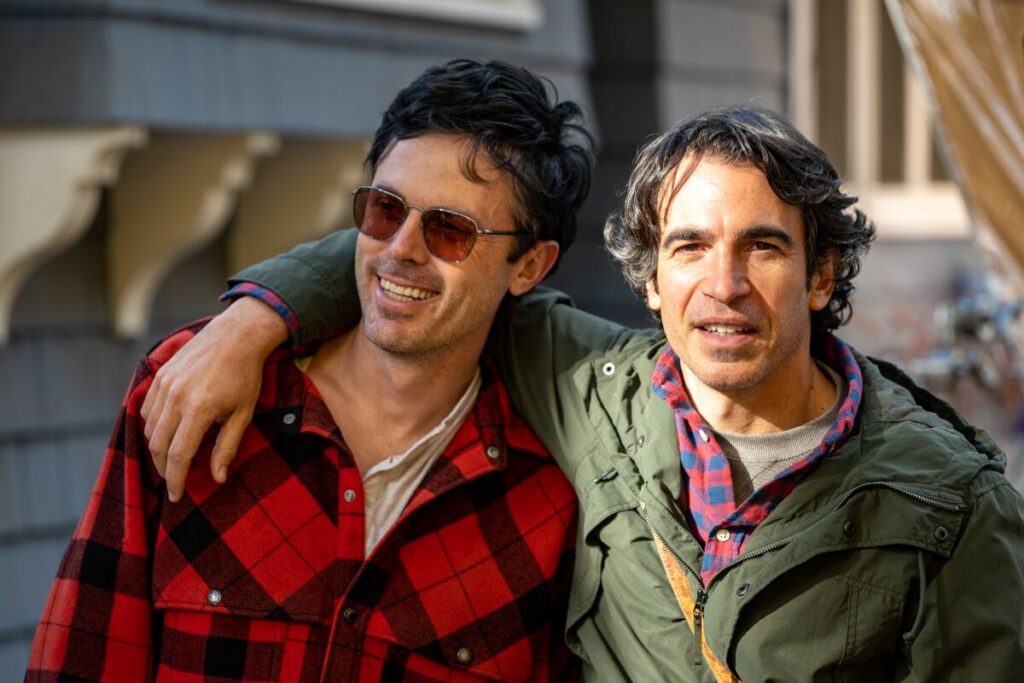Late-blooming recognition becomes both a blessing and a sideways needle scratch for the aspirations of a struggling singer-songwriter played by an epically downbeat Casey Affleck in director Bill Pohlad’s sweetly melancholic “Dreamin’ Wild.” A well-cast, modestly affecting drama of the kind studios regularly programmed in the before-IP times, it boasts a generous heart gently dusted with life’s complications as it beats a familiar rhythm of easygoing redemption.
Pohlad’s third feature is a follow-up to his admired Brian Wilson biopic “Love & Mercy,” and it tells another true-life music tale, one that, curiously, also alternates between eras that navigate promise, regret and the burden of untapped talent. Based on a New York Times article by Steven Kurutz, the movie follows musician brothers Donnie and Joe Emerson, reared in a remote logging community in eastern Washington state, who learn in middle age that their family-financed album of bluesy, mellow pop-soul — one they made as high schoolers in the late ’70s — has been rediscovered by junkshop-scouring vinyl scavengers, then amplified into retro-cool fame by newly appreciative music bloggers Pitchfork, as well as Jimmy Fallon.
When we meet the adult Don (Affleck), he’s a droopy soul running an unprofitable recording studio with his wife Nancy (Zooey Deschanel), a cheerier sort who’s also her husband’s bandmate at sparsely attended bar gigs and weddings. In his son’s bedroom, with a star-projecting nightlight pulling its metaphoric weight, Don tells him that dreaming is important, but hardly sounds as if he believes it.
Then his brother Joe (Walton Goggins), the downhome type who gave up music and still lives on the family’s land, brings bizarre news: A west-coast record label owner (Chris Messina), responding to growing internet fandom, wants to re-issue their 30-year-old vanity project “Dreamin’ Wild,” an adolescent labor of love and amateur virtuosity recorded in a cabin studio built by their proud dad (Beau Bridges) as a sincere investment in their ambition. (Flashbacks fill in those innocently hopeful, embryonic days, featuring appealing turns by Noah Jupe and Jack Dylan Grazer as the younger Don and Joe.)
Casey Affleck and Chris Messina in the movie “Dreamin’ Wild.”
(Felicity Donarski / Roadside Attractions)
But this uptempo change in the grown-up Emersons’ fortunes — publicity, royalty checks, a possible tour — has a quieter B-side in Don’s conflicted reaction, a subdued enthusiasm for the strangeness of it all mixed with hesitancy about what it means when a teen prodigy’s dreams outshine decades of creatively invisible adulthood. Affleck, who turned charismatic sorrow into an Oscar for “Manchester by the Sea,” is similarly solid here conveying Don’s well-brined discomfort over family guilt and thwarted solo ambition. He’s matched by the reliably authentic Goggins and sibling-drama veteran Bridges (long live “The Fabulous Baker Boys”), both naturally magnetic actors who wear their characters’ vulnerabilities and kindness like comfy old coats.
Pohlad treasures the harmonies and dissonances that wonderful actors create, even if his camera can excessively linger on Affleck’s brooding at the expense of an under-utilized Deschanel as the long-supportive wife. But the rolling, piney, misty Pacific Northwest is rendered with crispness by cinematographer Arnaud Poitier. There’s also an honest appreciation for the joy and work that musicians put into feeling out a sound, a lyric, a rehearsal.
The Emersons’ real songs do their part, of course, especially Don’s plaintive, intimate fuzzball “Baby” — you immediately understand its time-capsule charm — and when the actual family members eventually make their big appearance (a given in movies like these), the segue from actors to subjects is an appropriately sentimental hand-off. Tender vibes may be all that “Dreamin’ Wild” is really after, anyway, which at times keeps it from truly taking off. Then again, where some films strain to be concept albums, overstaying their welcome, this one prefers the simple pleasures of a well-produced pop ballad.
‘Dreamin’ Wild’
Rating: PG, for language and thematic elements
Running time: 1 hour, 50 minutes
Playing: In general release

